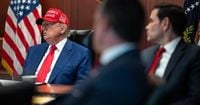On June 27, 2025, the U.S. Supreme Court delivered a pivotal ruling that reshaped the balance of power between the federal judiciary and the executive branch, handing President Donald Trump a significant victory in his ongoing battle over immigration policy. In a 6-3 decision authored by conservative Justice Amy Coney Barrett, the Court curtailed the ability of lower courts to issue nationwide injunctions that blocked the enforcement of Trump’s executive order limiting birthright citizenship for children born to undocumented immigrants.
This ruling did not immediately allow Trump’s controversial order to take effect but instructed the lower courts that had blocked it to reconsider the scope of their injunctions. Instead of applying nationwide, these orders must now apply only to the parties involved in the lawsuits, potentially enabling the administration to implement the policy in some states while legal challenges continue in others. The Court notably did not address the constitutionality of the executive order itself, leaving that question open for future litigation.
President Trump hailed the ruling as a “monumental victory for the Constitution, the separation of powers, and the rule of law,” telling reporters at the White House that his administration could now move forward with a host of policies that had been “wrongly enjoined on a nationwide basis,” including his birthright citizenship executive order. The order, signed on his first day back in office, directs federal agencies to refuse recognition of citizenship for children born in the United States unless at least one parent is an American citizen or lawful permanent resident.
Justice Barrett’s majority opinion emphasized judicial restraint, warning against what she called an “imperial judiciary.” She wrote, “No one disputes that the Executive has a duty to follow the law. But the Judiciary does not have unbridled authority to enforce this obligation—in fact, sometimes the law prohibits the Judiciary from doing so.” Barrett underscored that courts should only resolve cases and controversies before them, and when the executive branch acts unlawfully, courts should not exceed their power in response.
The decision was met with sharp dissent from the Court’s liberal justices. Justice Sonia Sotomayor, a Barack Obama appointee, delivered a scathing dissent from the bench, calling the ruling a “travesty for the rule of law” and “an open invitation for the government to bypass the Constitution.” Sotomayor’s written dissent decried the majority for ignoring the executive order’s constitutionality, stating, “The executive branch can now enforce policies that flout settled law and violate countless individuals’ constitutional rights, and the federal courts will be hamstrung to stop its actions fully.”
Justice Ketanji Brown Jackson, appointed by President Joe Biden, described the ruling as an “existential threat to the rule of law,” warning that the Court’s “complicity in the creation of a culture of disdain for lower courts, their rulings, and the law (as they interpret it) will surely hasten the downfall of our governing institutions.”
The case arose after federal judges in Washington state, Maryland, and Massachusetts found Trump’s executive order likely unconstitutional, blocking its enforcement nationwide. These judges issued so-called “universal” or nationwide injunctions, a practice that has grown increasingly common in recent years but which has drawn widespread criticism for allowing a single judge to halt federal policies across the entire country. The Trump administration challenged this practice, asking the Supreme Court to restrict the ability of lower courts to issue such sweeping orders.
While the Supreme Court’s ruling limits nationwide injunctions, it did not eliminate the possibility of broader relief through class action lawsuits. Plaintiffs challenging the birthright citizenship order promptly filed a class action motion and a request for a temporary restraining order to continue blocking the executive order’s enforcement. Conchita Cruz, co-founder of the Asylum Seeker Advocacy Project, called the Supreme Court’s decision “confusing” and a “sad day” for immigrant families, emphasizing that the ruling did not strike down birthright citizenship itself but only the procedural mechanism of universal injunctions.
William Powell, senior counsel for the Institute for Constitutional Advocacy and Protection, explained that the plaintiffs must now seek to strike down the order through other legal procedures, noting, “The Supreme Court’s decision is procedural. It talks about universal injunctions, but nothing in the majority opinion suggests in any way that the Supreme Court thinks that the president’s executive order is legal.”
The ruling leaves the door open for the birthright citizenship debate to continue in the courts and possibly before the Supreme Court in the future. Attorney General Pam Bondi stated that the Court would “most likely” decide the constitutionality of birthright citizenship during the next term starting in October, though the Court has not yet agreed to take up such a case or set a schedule for argument.
Beyond birthright citizenship, the Supreme Court’s decision signals a broader shift in judicial oversight of executive actions, limiting the scope of nationwide injunctions that have been used to block federal policies across the board. This change is likely to affect a range of cases where federal judges have issued sweeping injunctions against government actions.
The ruling also sparked a flurry of reactions from political and legal figures. Vice President J.D. Vance celebrated the decision on social media, calling it “a huge ruling by the Supreme Court, smacking down the ridiculous process of nationwide injunctions.” Meanwhile, Washington state Attorney General Nick Brown expressed disappointment but acknowledged that courts retain the authority to issue broad injunctions when necessary to provide complete relief to parties.
Legal advocacy groups like the American Civil Liberties Union condemned the ruling as “troubling” and “disappointing,” with Cody Wofsy, deputy director of the ACLU’s Immigrants’ Rights Project, calling the executive order “blatantly illegal and cruel.” The ACLU vowed to continue fighting to protect the constitutional rights of children born in the United States.
The birthright citizenship debate itself remains highly contentious. The 14th Amendment, ratified in 1868 after the Civil War, guarantees citizenship to “all persons born or naturalized in the United States, and subject to the jurisdiction thereof.” Trump’s administration argues that this does not extend to children born to undocumented immigrants or those in the country temporarily, a position that has faced widespread legal and public opposition. A recent Reuters/Ipsos poll found that 52% of Americans oppose ending birthright citizenship, with only 24% in favor.
On the same day as the Supreme Court ruling, President Trump also announced the abrupt termination of trade talks with Canada, citing a newly implemented digital services tax on U.S. technology companies as a “direct and blatant attack” on the United States. Trump promised to impose new tariffs on Canadian goods within a week, escalating tensions with the country, the U.S.’s second-largest trading partner. This move came despite recent efforts to negotiate new economic and security agreements between the two nations.
Meanwhile, Trump addressed ongoing tensions with Iran following U.S. airstrikes on Iranian nuclear sites. He criticized Iran’s supreme leader, Ali Khamenei, for defiant remarks after the strikes and announced he has abandoned plans to lift sanctions on Tehran. Trump did not rule out further military action against Iran if it resumes nuclear enrichment activities at concerning levels.
Back in Washington, other Supreme Court rulings on June 27 included decisions upholding a Texas law requiring age verification for adult websites, bolstering religious rights for parents seeking to opt their children out of LGBTQ-themed schoolbooks, and preserving key elements of the Affordable Care Act related to preventive care. These rulings reflect the Court’s conservative majority’s ongoing influence on social, health, and religious issues.
As the Supreme Court’s term closed with a flurry of decisions, journalists participated in the traditional “running of the interns,” rushing to disseminate the final opinions. President Trump held a White House press event celebrating the victories, with Attorney General Bondi also speaking. Yet, amid the legal triumphs, the birthright citizenship issue remains unresolved, poised to return to the nation’s highest court and the political spotlight in the months ahead.
Ultimately, the Supreme Court’s decision on nationwide injunctions marks a significant moment in the ongoing tug-of-war over executive power and judicial oversight. It underscores the complexities of immigration policy in America and sets the stage for further legal battles over the rights of children born on U.S. soil. For immigrant families, advocates, and policymakers alike, the fight over birthright citizenship is far from over.





